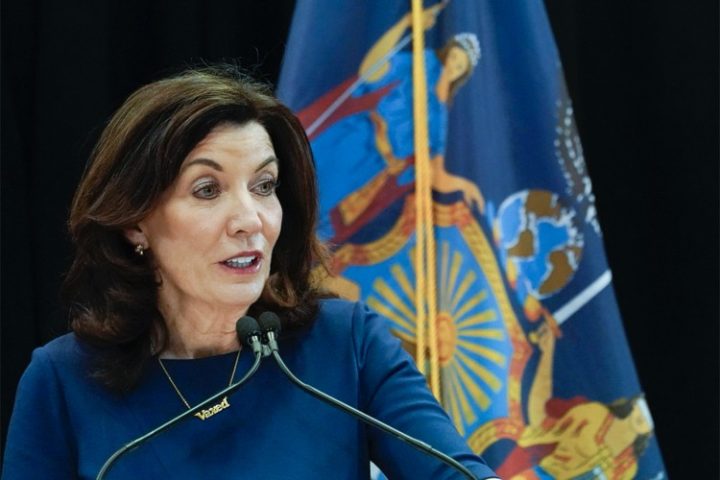
Legislation signed by New York Governor Kathy Hochul that went into effect Saturday declares racism a “public health crisis.”
The Democrat governor signed a suite of bills into law last month aimed at reducing “racial injustice” while promoting “racial equity” in the state.
One of the new laws officially declares racism a public health crisis and creates a “racial equity working group” within New York’s State Department of Health to make recommendations for legislative action.
“For far too long, communities of color in New York have been held back by systemic racism and inequitable treatment,” Hochul stated in a December 23 press release. “I am proud to sign legislation that addresses this crisis head-on, addressing racism, expanding equity and improving access for all.”
The move was celebrated by state Democrats.
“Framing racism as a public health issue compels organizations and governmental agencies to address the crisis in the systemic ways that other threats to public health have been addressed,” state Senator Kevin Parker was quoted as saying in the press release.
“For decades, racial inequalities have caused significant mental, physical, and financial hardships for people of color. These inequities have impacted how they live, the resources they have access to and more importantly their quality of healthcare.”
Hochul also signed the Hate Crimes Analysis & Review Act, which the bill’s co-sponsor, Senator Brad Hoylman, asserted will “ensure New York State collects and releases demographic data about hate crime victims and perpetrators.”
“It’s important we collect the demographic data on hate crimes to understand the root causes of these pernicious acts and take steps to head them off, which is especially true since there’s recently been a dramatic increase in hate crimes in New York,” Hoylman added.
Other legislation signed by Hochul creates a more “accurate and relevant” public record of Asians in the state. Per the new law, the state government expands the blanket terms “Asian American and “Pacific Islander” by requiring that each state agency involved with collecting data on the ethnic origins of residents use separate categories for those groups, such as Chinese, Japanese, Filipino, Korean, Vietnamese, Cambodian, Indonesian, Pakistani, Sri Lankan and Taiwanese.
Advocates of the legislation claim it will alleviate wealth disparities and help in allocating public funding to the various ethnic groups.
“As New York continues to face the devastation caused by the COVID-19 public health crisis, it is essential that the needs of all of our communities be understood and met,” state Sen. Julia Salazar said in the release. “For the diverse Asian-American and Pacific Islander communities in New York this cannot be accomplished without detailed data that recognizes and respects the experiences of the numerous groups that make up the AAPI communities.”
“While some AAPI communities share traditions or connections based on history or location, the majority of Asian Americans and Pacific Islanders are members of distinct ethnic groups who have their own culture, languages, and needs,” stated Assemblymember Yuh-Line Niou, who spearheaded the bill. “This law will allow our state to collect crucial data and information for each community, in order to help address the unique problems each community faces and better serve our AAPI New Yorkers statewide.”
Hochul also signed into law a bill mandating the translation of New York state agency websites for non-English speakers.
“Asian-American communities are among the most impoverished in New York,” Niou said. “They also faced some of the toughest headwinds even before the pandemic began while also being unable to navigate critical government services due to a lack of language accessibility. This legislation improves equity of access to crucial government services by implementing language accessibility in our government and helps build a New York that works for all of us, regardless of the language we speak.”
Last month, New York City made headlines when it approved legislation granting non-citizens the right to vote in all municipal elections.
Those new voters will include “any New Yorker who is a lawful permanent resident or authorized to work in the United States, who has been a resident of New York City for at least 30 consecutive days, and who meets all the qualifications for registering to vote under the Election Law other than U.S. citizenship,” per the City Council press release.




